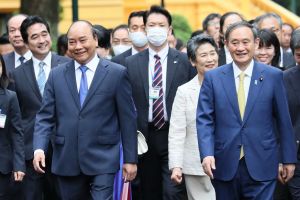Japanese Public Values Ties to US, But Would Prefer to Cooperate with China, Too

Dina Smeltz discusses survey data reflecting Japanese opinion on US-China relations.
Japanese Prime Minister Yoshihide Suga was the first foreign leader to meet face to face with US President Joe Biden earlier this month, signaling a renewed emphasis on Japan as a key ally in the region. The two leaders agreed to work together on challenges from China, the threat posed by North Korea, and to ensure the future of a “free and open Indo-Pacific.” A Chicago Council survey conducted March 26-April 9 demonstrates that while the Japanese people appreciate their country’s relationship with the United States, they would prefer to seek a middle ground in navigating the challenges posed by US-China tensions.
- Solid majorities in Japan say the US military presence in the Asia-Pacific increases stability in the region (73%) and think the US military presence in the region should be maintained at its present level (70%).
- A smaller majority support the long-term stationing of US soldiers in Japan (57% vs. 43% oppose).
- On a scale of a most unfavorable 1 to a most favorable 10, the Japanese public gives the United States an average rating of a 5.4. They give China an average favorability rating of 2.1, between ratings for South Korea (2.7) and North Korea (1.2).
- While they rate China on the low end for favorability, they expect that Beijing has ambitious intentions. The Japanese public divides between those who think China seeks to replace the United States as the dominant power in the Asia-Pacific (40%) and those who think it aspires to replace the United States as dominant force in the world (43%).
- China’s military power is considered a more critical threat than its economic power (55% vs. 42%).
- When forced to choose between their country's ties to the United States or China, most Japanese say Tokyo should work to strengthen relations with the United States even if it diminishes its relations with China (82%).
- But if given a choice, they would prefer to maintain strong relations with the United States at the same time as building a new relationship with China (50%) versus strengthen relations with US at expense of China (39%).
This survey was conducted March 26-April 9, 2021, by Ipsos on its Global Advisor online platform. among a weighted national sample of 1000 people aged 16-74 in Japan. The data are weighted according to census data with a margin of error of +/- 3.5% Results may not sum to 100 due to rounding, multiple responses, or the exclusion of “don't know” or unstated responses.
The survey was designed with input from American, Japanese, and Korean scholars as part of a broader project focusing on trilateral coordination in the Asia-Pacific. The survey was made possible by the generous support of the Carnegie Corporation of New York.

